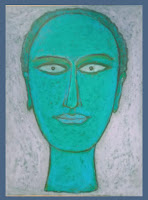If one simply observes inhalation and exhalation, it leads to a famous meditation technique, “Anapanasati”, taught by Siddhartha Gautama, the Buddha.
Buddha is not a person,
rather it is the formless pure existence of highest human evaluation realized by Gautama, and
many more.
 Simply observe, starting
with the physical body. Since the other six bodies will eventually show up on
their own, they are not discussed in Anapanasati. We will become increasingly conscious of the
second body the more we get to know this polarity—this simultaneous birth and
death, this simultaneous dying and living. Thus, the Buddha advises, have indifference
(upeksha) toward hatred. Show no emotion at all. Be unaffected by
feelings of love or hatred. Additionally, avoid being attached to somebody
because doing so will affect the other pole. We'll then be experiencing a
"dis-ease." There will be illness, and we won't feel comfortable.
Simply observe, starting
with the physical body. Since the other six bodies will eventually show up on
their own, they are not discussed in Anapanasati. We will become increasingly conscious of the
second body the more we get to know this polarity—this simultaneous birth and
death, this simultaneous dying and living. Thus, the Buddha advises, have indifference
(upeksha) toward hatred. Show no emotion at all. Be unaffected by
feelings of love or hatred. Additionally, avoid being attached to somebody
because doing so will affect the other pole. We'll then be experiencing a
"dis-ease." There will be illness, and we won't feel comfortable.
Buddha states: "The
coming of the beloved one is welcomed, but the going of the beloved one is wept
over. It is a terrible thing to meet someone disgusting, and it is a happy
thing to see someone repulsive go. However, if you continue to split yourself
into these opposites, you will end up living in hell."
Simply observing these
polarities leads one to conclude that one is a product of nature. It is
inherent to the physically seen "body", which is one of the seven
bodies.
This is the reason the body
exists; without it, it could not." And you transcend the body the instant
you realize it. We become conscious of the second body when we transcend our first
one. We become conscious of the third body when we can transcend the second
one.
 Witnessing is never limited
to life or death. It is beyond. The inhalation and exhalation are two distinct
entities, and if we identify as a witness, we cease to be either of them. After
that, a third force emerged. We are no longer the bodily embodiments of prana;
rather, we are prana, the observer. We can now understand that life is a
physical manifestation of this polarity, and that life cannot exist if this
polarity ceases to exist. It requires tension to exist—the ongoing tension of
arrival and departure, the ongoing tension of birth and death. This is the
reason it exists. It exists because it constantly shifts between the two poles.
Witnessing is never limited
to life or death. It is beyond. The inhalation and exhalation are two distinct
entities, and if we identify as a witness, we cease to be either of them. After
that, a third force emerged. We are no longer the bodily embodiments of prana;
rather, we are prana, the observer. We can now understand that life is a
physical manifestation of this polarity, and that life cannot exist if this
polarity ceases to exist. It requires tension to exist—the ongoing tension of
arrival and departure, the ongoing tension of birth and death. This is the
reason it exists. It exists because it constantly shifts between the two poles.
"Love and hate" are
the fundamental polarities in the second body. It takes many different forms.
This like and disliking is the fundamental polarity, and it changes every time we
are liking something or dislike something. However, we never witness it. We are
only deceiving ourselves twice if we ignore our dislike when it turns into
something we don't like and keep telling ourselves that we will always like the
same things. When we don't like something, we keep disliking it and never let ourselves
recognize the times have have enjoyed it.
In the second body, the vital force takes the form of like and dislike. However, it is the same as breath: nothing changes. Here, influence serves as the medium, just as air does in the physical body. The second body is immersed in a complex environment. It's not as easy as meeting someone and instantly become fond of them. It won't matter; the likes and dislikes will keep alternating all the time. The etheric body's breath is this polarity, which gives it existence. We can merely laugh if we happen to witness it. Then neither an enemy nor a friend exist. After that, we realize it's just a natural occurrence.
Picture Courtesy: Photographs used in this blog are paintings by Rudradev Sen.





No comments:
Post a Comment